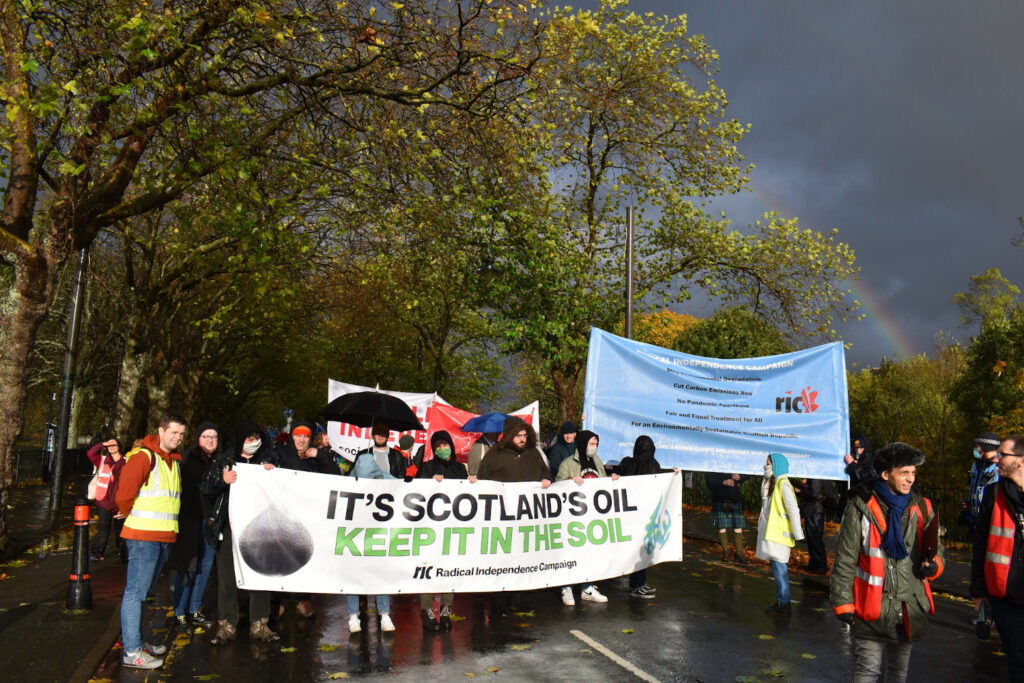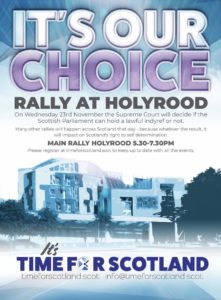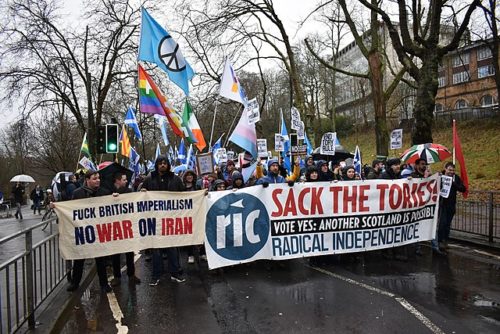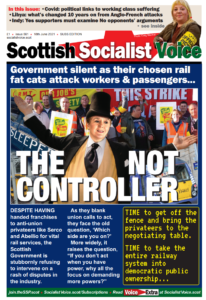Catalonia goes to the polls on Sunday 14 February (14-F) in elections for the devolved parliament and government (“Generalitat”), The elections will be closely watched in Scotland, particularly by the independence movement looking to learn from the struggle. Glasgow Radical Independence Campaign and Dundee Radical Independence Campaign will shortly hold a joint public discussion meeting on the elections.
Below we republish an article by Lorena Serantes, first published on the site of the Scottish Republican Socialist Platform (RSP), analysing the political parties contesting the Catalan elections.
Catalan Fourth Internationalists in Anticapitalistes (part of the confederal Anticapitalistas organisation across the Spanish state) have also published a statement on the elections, available in Catalan here and in English here.
Anticapitalistes support the Catalan independence movement but warn of the need for a social response to neoliberal policies in Catalonia and the Spanish state, one that defends working class living standards and state services from cuts. In recent years sections of the radical left within both Catalonia and the Spanish state, including Podemos, the municipal movement around Barcelona Mayor Ada Colau, and the Republican Left (ERC) party that is aligned with the SNP in Scotland, have attached themselves to neo-liberal coalitions with social democrats and right wing nationalists. Anticapitalistes call for a break (or “rupture”) from this.
They are not standing in the elections themselves, but give support to the candidates of the CUP (“Popular Unity Candidacies”), the pro-independence, anticapitalist, ecosocialist and feminist grouping contesting the elections and described below. CUP currently have four seats in the Catalan Parliament and are looking to increase their influence.
Anticapitalistes also draw attention to the rise of the far right, openly fascist, Vox party winning seats in the new parliament for the first time.
Political party shifts ahead of the Catalan elections
RSP member Lorena Serantes explores ideological shifts within the Catalan political parties ahead of next week’s crucial election.
Since the 1 October (1-O) independence referendum took place nearly four years ago, the political situation in Catalonia has gone through many relevant changes that can be vital for the next election and its wider context.
First, we need to understand the fundamentally imperialistic nature of the Spanish State, shown by the tactic of judicialisation of the whole Catalan independence process (especially their most recent move against Generalitat president Quim Torra). Secondly, the Catalan independence movement needs to be understood as a popular uprising for democracy and the right of self-determination within a strongly centralised state. We shouldn’t refer to it as an electoral movement, nor as a civil disobedience tactic to change the nature of Spain into a federal republic. The Catalans have been able to respond to the inaction of pro-independence parties and groups (both on the right and left-wing spectrum) by strengthening the street-focused level of activity and putting pressure on the parties to advance on building the new Catalan state.
There’s a lot of work which analyses the Catalan process, the incarceration of the ANC and Òmnium leaders and the strategies of the Catalan politicians and the national government (I must clarify when I’m talking about “national” I mean the Catalan executive, as I deny the character of ‘nation’ to Spain, a state composed of nations and regions). My intention in this article, however, is to define and explain the political party shifts that will have an impact on the behaviour of the Catalan electorate. I will propose at first the main factors that accelerated these transformations within the parties and the party system. Following that, I will focus on developing the main topic of the article.
The main political formations from the pro-independence and the unionist blocs have increased the existing uncertainty around the issue of independence
Background
Before I begin, there are some points I need to make clear. My use of the term ‘political party shifting’ doesn’t strictly align with the concept as utilised by political scientists. In political science we refer to it as: (1) membership changes within political parties and (2) redefined voting patterns (i.e. when the electorate switches its traditional behaviour towards parties, giving way to realignments in the political system). In contrast, I will combine both conceptual definitions and add the ideological changes the Catalan parties have gone through during these last few years. Keeping this in mind, my intention is not to write a scientific article but one that helps to understand the situation of party politics in the northeastern nation.
Both Spanish general and regional elections (i.e. elections taking place in the autonomous communities) use the proportional representation method known as the D’Hondt formula, also used for the Scottish Parliament’s regional lists. Each constituency is presented with a closed list of candidates from every party or coalition and elects a number of representatives in accordance with its population. Catalonia elects to its parliament 135 members from its four provinces (85 from Barcelona, 18 from Tarragona, 17 from Girona and 15 from Lleida). The threshold which parties need to reach to win representation is 3% of the vote.
Catalonia has changed since 2017 and the events following the 1st of October referendum. Attention has been drawn to the courts of justice, the incarceration of politicians and activists and the exile of the Catalan president Carles Puigdemont, but nobody has focused on explaining how the main political formations from the pro-independence and the unionist blocs have increased the existing uncertainty around the issue of independence.
I will not use the term “constitutionalist” or “constitutional” to define the parties that oppose independence because I don’t think it’s accurate and correct. A constitutionalist party is by definition a political formation that respects the constitution and legality of some territory. Spanish parties refer to themselves this way to take the powerful concept of “the law”, which is incredible given how many times they have conveniently forgotten to follow it. Instead, they are profoundly unionist parties that agree on rejecting Catalan independence (or even more autonomy).
Changes
It’s clear to me that there have been many factors producing changes in Catalan politics. I will therefore develop some of them.
In the pro-independence bloc – made up of the catch-all Junts per Catalunya (Together for Catalonia), the centre-left to left-wing Esquerra Republicana de Catalunya (Republican Left of Catalonia/ERC), and the far-left Candidatura d’Unitat Popular (Popular Unity Candidacy/CUP) – the exile of Puigdemont (Junts) and other leaders from ERC and the CUP (Marta Rovira and Anna Gabriel) have pushed a renewal of leadership and new strategic plans for the future.
Leadership changes often produce positive effects (parties with a bad image can rise and recover) but also can create negative ones (voters attached to the candidate will no longer identify with the party if the new proposed faces don’t represent a form of continuity). Fights to elect party leaders with a certain ideological background take place within the liberal and social democratic-oriented parties, which may result in party fragmentation or splits. Left-wing projects with a democratic structure have to decide their future too, but instead of promoting internal competition amongst different traditions, they might debate, discuss and respect all the options, establishing other ways and methods to elect a new leadership from their membership. I’m not an expert on structural changes within parties, however I understand how these can make a big impact on electoral performance.
Unionists
The unionist bloc is formed of the classic right-wing Partido Popular (People’s Party/PP), the liberal right-wing Ciudadanos (Citizens/C’s), the social democrat centre-right Partit Socialista de Catalunya (Socialists’ Party of Catalonia/PSC) and the new extreme ultranationalist right-wing Vox. The Spanish nationalist nature of these formations has taken them to focus on the politics of the state rather than on Catalan issues, content to blame the independentist forces for the rise of extreme right groupings on the streets of Barcelona (and also other territories of Spain like Valencia) rather than address the societal problems that gave rise to them. It’s important to clarify the PSC is not the same as PSOE in the other Spanish regions and nations, although they set up an agreement a long time ago to stand together in Catalan elections. The Catalan PSOE branch disappeared in the 1970s, since then the PSC has become the electoralist brand of the social democrats in the northeast.
PP and PSOE, the major parties in Spain, agreed on attacking the Catalan independence movement the same way, which has distanced them from Catalan civil society. Looking at Spanish politics as a whole, they have preferred to appeal to the anti-Catalan middle and high class of Madrid and the South (Andalusia, Murcia, Extremadura). PSOE’s tactic has been to feed the extreme right (specially on the PP/PSOE-controlled media) to divide the Spanish right-wing parties and make Vox the political scarecrow which can provide a reason to vote for the “left alternative” they propose. This obviously has opened a channel for Vox to promote hate speech and extremist ideologies which were previously hidden within the PP. C’s (Citizens), a free-market liberal-oriented formation, has been trying to occupy each space left out by the two major parties, from the right to the moderate left, always with a nationalistic narrative that tries to exclude everyone that doesn’t want to feel Spanish. Polarisation has settled in Catalonia because of the trajectory of Spanish nationalism.
Political parties in Catalonia have changed since 2017 from an ideological point of view and also in the electorate they want to appeal to
Therefore, we have two polarised blocs, one that leans to the centre-left civic nationalist tradition and another spanning the right-wing ultranationalist spectrum. But having said that, we cannot end our analysis with this simplistic explanation because political parties in Catalonia have changed from an ideological point of view and also in the electorate they want to appeal to. I will not analyse Podemos and the Comuns (Commons) coalition here, since they should be regarded as a distinct phenomenon and will require a separate article to comprehend their position, fragmentations and internal instability. First, I will analyse the pro-independence bloc shifts, which are significant due to a fragmentation pattern in the traditional conservative nationalist groups.
Why an election
This election has been called not only because of the suspension of Quim Torra (again using the Spanish supposedly democratic law), but also due to the conflict between government partners Junts and Esquerra. Both of the parties had interest in holding the presidency, which caused a rupture of the coalition during the Catalan budget negotiations. As of today, Esquerra has 32 seats in Parliament, whilst Junts (Torra’s party) has 20 representatives. With the break-up of the government coalition, it’s obvious that talks of forming an electoral coalition like Junts pel Sí (2015-2017) won’t occur, and both parties will run separately.
Junts is an alliance of little Catalan nationalist and Catalanist right-wing and centre-right liberal parties that emerged from the rupture of Convergencia i Unió (CiU) in 2014-15. CiU was formed in 1978 as a coalition of Convergencia Democrática de Catalunya (CDC), with Catalan nationalist ideas, and Uniò Democrática de Catalunya (UDC), a Catalanist non-independentist party. This alliance governed Catalonia for long periods of time (Jordi Pujol’s executives) with a liberal program of deregulating basic public services and joining with Spanish nationalist parties at a state level, specially with the PP.
After the alliance was disbanded, UDC followed a long way of talks with the PSC, finally joining the social democratic party, arguing that independence is not the solution for Catalonia’s problems. However, CDC changed its name to Catalan European Democratic Party (PDeCAT) to (1) avoid comparisons with the old CiU coalition, which had been criticised for a tremendous history of corruption and fraud and (2) give the party a more centrist and pro-independence image. The party campaigned for the 2017 referendum, and the events that occurred after the vote made a big impact on the leadership of the party.
Many PDeCAT leaders were tied to the right-wing tradition of CDC, something that bothered Puigdemont’s pretensions of giving the party a ‘left-wing’ renewal. He founded Junts per Catalunya in July 2018, accompanied by civil society well-known leaders such as the Jordis (Jordi Sánchez and Jordi Cuixart), and managed to unite dissident members from Esquerra, the PSC and even the CUP. PDeCAT’s leadership, although reluctant at first, merged into Puigdemont’s centrist movement, as well as other minor political parties (Action for the Republic, The Greens, Independence Rally, Democrats, etc.). Junts has been defined as a populist, centrist and Catalan nationalist party. I will challenge the concepts of populism and centrism by using a term from political science instead: the catch-all party (in Spanish, partido atrápalo-todo).
These types of parties appeal to transversalism across the political spectrum, escaping a left-right conceptualisation. Junts is a pro-independence ruling party in a typically constituted Western liberal democratic state, which will never push for a working class republic based on a socialist economic model. However, the CDC right-wingers are now trying to claw back the political space from CiU by standing alone in this next election, something that breaks Puigdemont’s plans as the confluence between right-wing and left-wing groups is now impossible. Hence, with the most reactionary sector gone (PDeCAT, Convergents and other liberal-conservative soft-nationalist minor groups), Junts has become a radical centre-left party who are very critical of the Spanish state and the conservative ideology the Spanish parties share, but less so with the disastrous handling of the public services at a Catalan level. Junts is becoming the new PSC in the pro-independence bloc, which implies the whole independence movement is going to move to the left, electorally speaking. Nevertheless, the party shift doesn’t mean a change in voting patterns and behaviour, so it’s very likely the Catalan bourgeoisie will still trust Junts to form a government in the nation.
ERC can become the new PSC in next week’s election
The two left-wing parties in the pro-independence bloc certainly have more disagreements than points of unity. Esquerra, or ERC by its initials in Catalan, is a social democratic party with a progressivist tendency, and a relevant republican discourse, refusing to accept the terms of the Spanish monarchy and the two-party oligarchic system around PP and PSOE (which has now been broken by the birth of Podemos, C’s and Vox). However, its language on self-determination evokes an individualistic conception of the rights of the people to decide their future, a liberal nationalist view they share with Junts. In actuality, ERC’s nationalism is just a means to an end – their ultimate aim is to create a Catalan Republic based on the principles of Spanish republicanism.
It’s now clearer than ever that a Spanish Republic is impracticable due to the resistance of the major powers to simply hold a referendum on that matter and the absence of a single Spanish nationalist party campaigning for the abolition of the aristocracy. The traditional republicans were Izquierda Unida (United Left), which is now almost dead and subjugated to Podemos’ leadership. ERC always comprised people from different ideological backgrounds within the Catalanist left, until the 1980s when they started to recognise the necessity of winning an independent state in Catalonia, rather than pursuing federalism. This shift to an openly nationalist position moved away from the party those who didn’t want independence to happen, joining either PSC or Esquerra Unida (the Catalan branch of United Left). Since the referendum, with the exile of ERC’s leader, Marta Rovira, the vice president of the Catalan government Pere Aragonés has gained the control of the party, and, in contrast with Torra’s radical independence continuity policy, he has tried to calm down the nationalists with a new turn to the federalist response. The Spanish central administration has offered the Catalan executive a seat at the negotiating table, which ERC has accepted.
The problem is the agreement between PSOE’s government and ERC ties the republican party to Pedro Sánchez and his policies, as the Catalan party supported him as prime minister after the November 2019 general election. Junts and the CUP have abstained from this dialogue instead. The current strategic decision coming from the elite of the party is focused on “expanding the party’s base” to a larger membership that not only includes nationalists and independentists, but the Catalanist wing of the PSC, communists, ecologists and Podemos ex-affiliates. We could see this as an attempt to build a broader Catalanist front composed of social democrats, liberal socialists, ecologists and eurocommunists to get votes from the traditionally PSC-oriented electorate. ERC can become the new PSC in next week’s election.
The CUP is the left-wing alternative formation that seeks to challenge the old social democracy. The “cupaires”, as they are known in Catalan, are anticapitalists, feminists, ecosocialists, and independentists. There are different caucuses within the membership (anarchists, Trotskyists, Marxist-Leninists, etc.), and their structural organisation is quite democratic. The CUP is now under a process of leadership changes since the exile of Anna Gabriel, CUP’s leader during the time of the referendum, who was charged for “sedition” by the Spanish Supreme Court, the same as Puigdemont and other Catalan politicians. They have been experiencing tough times trying to rebuild trust with left-wing voters after the leadership of sociologist Carles Riera, under whom their electoral performance suffered big losses in 2017 and left them forced to share a parliamentary group with the PP as a result of not being large enough to create one of their own (requiring six representatives).
The unionist bloc
In the unionist bloc, the PSC is the major political formation with a strong Spanish nationalist campaign, especially after PSOE, its partners at a state level, won the 2019 general election under Pedro Sánchez, who belongs to the rebel caucus of the traditional social democratic party. The Catalan socialists moved from a Catalanist and federalist ideology at first towards a more right-wing approach following the 2017 referendum, which explains the removal of the federalist sector, which joined ERC. The PSC has two different types of electorate: Barcelona and Tarragona’s anti-independence middle class, and Girona and Lleida’s working class. In short, they appeal to the oligarchies in two provinces whilst keeping a progressive rhetoric. This switch from left to right is applicable only to the national question, i.e., it’s still a social democratic party in economic terms, but no longer Catalanist, as it has incorporated a strong anti-independence policy and a Spanish nationalist ideology. Shifting this way, the PSC will attempt to gain back its electorate lost to C’s (Citizens) in 2017. The liberal current is now more relevant and has more capacity than ever within the formation.
Ciudadanos-C’s is a liberal centre-right party that came into Catalan politics to campaign against Catalan-only-speaking schools and Catalan nationalist ideals (paradoxically, with a Spanish ultranationalist approach). Its desire to celebrate Spanish identity above Catalan identity has convinced the anti-nationalist PSC supporters and the ultra right-wing groups to give their votes to Albert Rivera’s (now Inés Arrimadas’) party instead of the declining Catalan PP. Consequently, C’s was the winner in 2017 elections, managing to achieve a combination of the anti-nationalist vote with that of the working class (mostly in Barcelona). C’s got 36 representatives (25.4% of total vote), but from 2018 onwards its constant opportunistic turns to the right or left according to whatever would suit best at the time rendered the party incapable of maintaining a good position in Spanish politics. In last year’s general election, C’s suffered a huge loss of seats (from 57 to 10), and, after their leader’s resignation, the liberals are experiencing a precipitous decline that will definitely bring joy to the PP and PSC.
Neo-fascist and neo-Nazi groupings that previously tended to operate on the margins of politics now have an electoral vehicle to bring their hate speech to parliament
The classic right-wing People’s Party (PP) isn’t quite as popular in Catalonia, as they are associated with the past and Francoist ideologies. Despite the overwhelming majority of Catalans rejecting the party, the PP has been capable of retaining some votes thanks to its anti-Catalan nationalism message and good relations with CiU. The rise of C’s during the Catalan independence process and the recent appearance of Vox have prevented the PP from becoming the first option for Spanish nationalist voters. Also, the bad choices of the leadership, with the ex-candidate Xavier García Albiol being openly racist against Roma people and the lack of new charismatic leaders in Catalonia to replace him, have left the party with no chance of ruling the Generalitat. They would prefer to run Catalonia from the central administration in Madrid, despite not having more than four representatives in the Northeastern nation.
As for the extreme right-wing, represented by the Spanish ultras of Vox, it is too soon to analyse the situation of Santiago Abascal’s group in the northeast. We know that, since the referendum, the Spanish right-wing has become far more extreme and exclusionary and, even though Vox has no representation or electoral base in Catalonia, neo-fascist and neo-Nazi groupings that previously tended to operate on the margins of politics now have an electoral vehicle to bring their hate speech to parliament. It’s concerning how Vox’s participation in the Catalan institutions could turn into another excuse for the Spanish state to pass legislation that impedes self-determination rights, and it is, of course, a threat to the human, collective and individual rights of the Catalan people.
Conclusions
The polls show a strong decline of C’s, which would obtain 13-15 seats, down from the 36 they have held since 2017. Polls also show a disputed and narrow victory for either PSC or ERC, with 30-35 seats for each party. Junts would fall consequently to ERC’s rise. Podemos-EU-Equo and PP would remain in between seven and 12 seats. We will probably see a recovery from the CUP; the left-wing party would obtain eight to 14 seats (they have had four since 2017). Vox would obtain anywhere from six to 10 representatives, making a big breakthrough in Catalonia.
There will be a huge difficulty in forming alliances and there is the possibility that the pro-independence and unionist blocs will break themselves apart because of the complexity of the situation and the narrow outcome expected. If the PSC wins the election, the obligation to develop agreements with the extreme right to get a majority might challenge the unionist bloc’s possibilities (primarily due to PSOE’s strategy at the state level opposing Vox, which makes this coalition incoherent in Catalonia, rather than democratic obligation). In the same way, ERC and Junts will require an agreement (including the CUP) to regain the parliamentary majority. Both parties are currently in a dispute and taking opposite directions ideologically and strategically. This means the idea of a PSC-ERC coalition is quite possible. We still don’t know the political implications that could have, but what we can anticipate is the end of the independence process started in 2014-15.
Glossary
Catalanism: Ideology pointing to the defence of Catalan’s autonomy within the Spanish state, it was developed around the first period of the 20st century by early nationalists who didn’t support self-determination but thought Spain should be a decentralised country.
Catalan nationalism: Ideology that identifies Catalonia as a nation with inalienable rights such as self-determination within the Spanish state.
Catalan independence: Ideology that defends Catalonia should be an independent state outside Spain.
Transversalism: Political strategy that, in opposition to identity politics, intends to represent every group of society regardless of class, ideology, nationality, race or gender.
Regionalism: Ideology that defends regional autonomy and decentralisation policies within a state.
Introduction and article republished from Socialist Resistance
Original article from Republican Socialist Platform.




